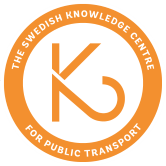
The public transport market is characterised by a dynamic relationship between supply and demand, and the fact that a significant part of the supply is funded by taxes. Most of the local and regional public transport in Sweden is operated as procured transport services. This means that the conditions for public transport are largely determined within the framework of a scheme involving public clients and private contractors. For several years and in different ways, it has been an ambition of regional public transport authorities to influence the costs, quality, environmental performance, supply and demand by means of new contractual models, such as through incentives for the operators.
These models have consequences for passengers and for the design of the transport system. In addition to the procured transportation, there are public transport services provided on commercial terms, as well as public transport in its own right. Regional public transport is financed partly through taxes and partly through ticket revenues. The future investment needs and operating costs of public transport and how these are to be financed is a growing challenge, especially in light of ambitions to achieve an increased share of motorised travellers for public transport. Different price strategies can increase or reduce passenger numbers, and lead to increased or reduced operating costs.
Overall research issues
Understanding passengers' circumstances, preferences and experiences is fundamental to developing public transport in the desired direction. Knowledge is also needed about how organisational reforms affect the market in ways that create increased public benefits. Such reforms generate effects that may be intentional or unintentional and unforeseen.The following overall issues are emphasised within the area:
- How do different supply and price strategies effect passengers using public transport, e.g. differentiated pricing and free public transport, and how does it affect different groups of passengers with regard to e.g. availability and distribution? How can such strategies be implemented in ways that achieve policy goals regarding e.g. socio-economic efficiency, and which are also acceptable to citizens and the various social actors?
- How do different contract and business models affect the market and how do they contribute to achieving politically determined goals, including how those goals are translated and interpreted, for example in contracts? How do requirements in the contracts affect the preconditions and expectations of those who provide public transport?
- Which factors affects the conditions for public transport authorities and public transport companies within the existing procurement system, e.g. technology development, competition levels, standardisation of contracts? Which factors influence the choice of regime, e.g. the presence of commercial traffic and traffic operated independently? How can knowledge of these factors be used to develop the organisation of public transport?
- What preconditions exist to change the funding of the operation of and new investments in public transport, e.g. in ways that more clearly link the funding to those who benefit from such measures? How does it affect the incentives of different administrative levels to implement measures?
- In what way and with what result can value-creating partnerships between regional public transport authorities, transport companies and municipalities etc. help to develop the public transport market, including the ability to develop innovate solutions?
Expected result
The research is expected to lead to an increased understanding of the public transport sector's market conditions, how different strategies and business models affect the ability to achieve predetermined public transport objectives, including targets for increased passenger numbers and increased cost efficiency. The research also helps highlight and analyse new approaches to the funding of public transport in the future. The research will provide public transport authorities, public transport companies and other relevant actors with insights on the market's current organisation and how it can be developed in the future.
